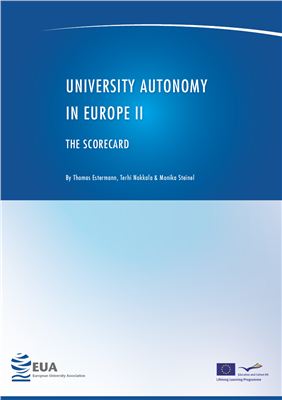European University Association (EUA), 2011, 84 p.
University goveance and the relationship between the state and higher education institutions are issues that have generated intense debate in recent years, since they are seen as important conditions for the modeisation of Europe’s universities. EUA
has monitored and analysed the development and impact of autonomy and related reforms through a wide array of studies as well as through stakeholder debates, conferences and its Institutional Evaluation Programme. The importance of autonomy for EUA’s member universities is reflected in the findings of EUA’s Trends 2010 report, in which 43% of university respondents viewed autonomy reform as one of the most important institutional developments of the past decade (Sursock & Smidt 2010: 18). Indeed, various studies have demonstrated the positive effects of institutional autonomy (Aghion et al. 2008: 5; Reichert & Tauch 2005: 7; Estermann & Bennetot Pruvot 2011).
With its study University Autonomy in Europe I Estermann & Nokkala 2009), EUA has started to provide data on institutional autonomy, which aims to enable university practitioners and policy makers to compare systems more effectively across Europe.
The Autonomy Scorecard represents a further step in this process by describing the current state of affairs in university autonomy and by ranking and rating higher education systems according to their degree of autonomy. With the development of a methodology that measures and scores the different levels of institutional autonomy in Europe’s higher education systems, this project is treading new ground. It aims to engage all relevant stakeholders in a more in-depth debate on autonomy and thereby help to improve higher education systems. It provides an institutional
perspective on autonomy by involving the university sector, chiefly represented by the European national rectors’ conferences, at all stages.
University goveance and the relationship between the state and higher education institutions are issues that have generated intense debate in recent years, since they are seen as important conditions for the modeisation of Europe’s universities. EUA
has monitored and analysed the development and impact of autonomy and related reforms through a wide array of studies as well as through stakeholder debates, conferences and its Institutional Evaluation Programme. The importance of autonomy for EUA’s member universities is reflected in the findings of EUA’s Trends 2010 report, in which 43% of university respondents viewed autonomy reform as one of the most important institutional developments of the past decade (Sursock & Smidt 2010: 18). Indeed, various studies have demonstrated the positive effects of institutional autonomy (Aghion et al. 2008: 5; Reichert & Tauch 2005: 7; Estermann & Bennetot Pruvot 2011).
With its study University Autonomy in Europe I Estermann & Nokkala 2009), EUA has started to provide data on institutional autonomy, which aims to enable university practitioners and policy makers to compare systems more effectively across Europe.
The Autonomy Scorecard represents a further step in this process by describing the current state of affairs in university autonomy and by ranking and rating higher education systems according to their degree of autonomy. With the development of a methodology that measures and scores the different levels of institutional autonomy in Europe’s higher education systems, this project is treading new ground. It aims to engage all relevant stakeholders in a more in-depth debate on autonomy and thereby help to improve higher education systems. It provides an institutional
perspective on autonomy by involving the university sector, chiefly represented by the European national rectors’ conferences, at all stages.

